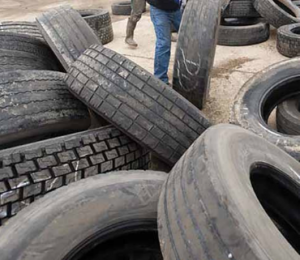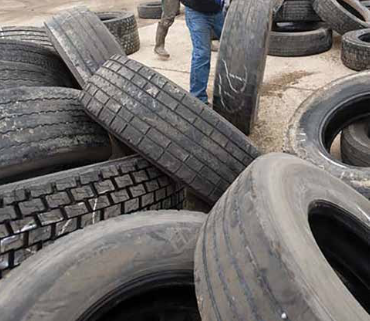Tyres aged 10 years and older on HGVs, buses, coaches and minibuses are to be banned in Northern Ireland (NI).
The announcement by Northern Ireland’s Vehicle Policy Unit at the Department for Infrastructure (DfI) follows the results of its public consultation period, which closed on 18th December of last year.
It will now proceed to ban tyres aged 10 years and older on the front axles of HGVs, buses and coaches, and to the tyres on all axles of minibuses when fitted in single configuration.
The changes being implemented in Northern Ireland will align with the changes introduced in Britain on 1st February, 2021.
Several of the consultation responses highlighted that the introduction of tyre age restriction based on the age from production is not a realistic way of assessing the road safety condition.
They said that the introduction of the tyre age restriction does not negate the need for an informed consideration by a trained expert tyre examiner of all the indicators of a tyre’s condition, regardless of whether the tyre is subject to the age restriction or not.
However, the responses did again strongly advocate alignment of Northern Ireland approach adopted in Great Britain.
The DfI considered evidence provided to DfT by Transport Research Laboratory (TRL) and is of the view that structural changes can occur within older tyres that are not always visible from an external inspection of the tyre.
By introducing a legal age for tyres, the DfI said it is aiming to minimise the number of tyres that are in use on NI roads that could have internal structural defects as a result of their age.
The restriction will also apply to re-treaded tyres, where the date of re-treading will be used to determine the age of the tyre. There will be no requirement for the date marking to be displayed in any orientation and hence no material costs.
There will be an exemption for two groups of vehicles:
1. Those vehicles that are currently exempt from tyre roadworthiness regulations (including agricultural tractors that travel at low speeds) to remain consistent with existing legislation.
2. Historic vehicles that are currently exempt from roadworthiness testing, providing they are not used commercially. The DfI said that it recognises that historic vehicles are usually well-maintained, are used infrequently and do not travel at high speeds.
The regulations will apply to drivers or operators of non-compliant vehicles on Northern Ireland’s roads, regardless of the country of registration. The DfI is set to bring forward amending legislation to put the decisions set out in this document into effect, with an implementation period of three months.
In the Republic of Ireland, the relevant regulations note that it is an offence to drive with defective or worn tyres. On the age of tyres – if more than six years old – they will not fail the NCT or CVRT provided they meet the minimum tread depth of 1.6mm and are free from any defects (i.e. cuts, bulges, tears etc.). So all tyres over six years will receive a pass advisory. This is not a fail, just a advisory precaution.
In the Republic, tyre offences attracts a fine of €80 and up to four penalty points upon conviction.



